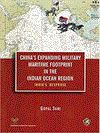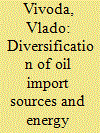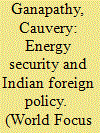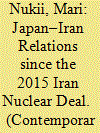| Srl | Item |
| 1 |
ID:
154802


|
|
|
|
|
| Publication |
New Delhi, Pentagon Press, 2017.
|
| Description |
119p.pbk
|
| Standard Number |
9789386618122
|
|
|
|
|
|
|
|
|
|
|
|
Copies: C:1/I:0,R:0,Q:0
Circulation
| Accession# | Call# | Current Location | Status | Policy | Location |
| 059164 | 359.030951/SUR 059164 | Main | On Shelf | General | |
|
|
|
|
| 2 |
ID:
092772


|
|
|
|
|
| Publication |
2009.
|
| Summary/Abstract |
This paper explores the relationship between the diversification of sources of imported oil and energy security of oil-importing countries. It examines the importance of diversification policy for oil importers, explains why oil importers implement oil diversification policy, and contextualizes the oil import diversification strategy in the overall energy security policy of oil importers. The paper analyzes the factors and the contexts that affect the level of importance assigned to oil import diversification policy in oil-importing countries, and the limitations that may affect the successful implication of oil import diversification policy. The examples are drawn from the world's top three oil importers, the United States, Japan, and China. The policymakers in these and other oil-importing countries place much importance on energy security. The diversification of oil import sources is used as one of the strategies to enhance energy security in oil-importing countries. This paper is important for policymakers in oil-importing countries as it provides them with a qualitative conceptual framework with which to evaluate the need to diversify their countries' sources of imported oil, and with which to identify the likely limitations to the successful implementation of oil import diversification policy.
|
|
|
|
|
|
|
|
|
|
|
|
|
|
|
|
| 3 |
ID:
116042


|
|
|
| 4 |
ID:
114312


|
|
|
|
|
| Publication |
2012.
|
| Summary/Abstract |
This paper analyzes the positioning of European and American transnational oil companies in the supply of oil from outside Europe to European countries. The analysis focuses on the triangular relationship between: the control that these companies exercise over oil refining and the marketing of petroleum products in Europe; the international production of crude by these companies in oil regions; and the import of crude oil by European countries. Two indicators were developed to assess the relevance of these large corporations: (a) the extent of the supply to their European refineries via their own international production, and (b) the contribution of each company to the total crude oil imports received by six European countries.
|
|
|
|
|
|
|
|
|
|
|
|
|
|
|
|
| 5 |
ID:
160484


|
|
|
|
|
| Summary/Abstract |
The US–Japan alliance has been one of the most important elements in configuring Japanese diplomacy since World War II. Accordingly, Japan’s relations with Iran always require striking a delicate balance among Japan’s security policy based on the US–Japan alliance, its energy demands, and its historically good bilateral relations with Iran. Japan welcomed the nuclear deal between Iran and the P5+1 group of nations in 2015. Iran holds the world’s second largest natural gas reserves and ranks fourth in proven crude oil reserves. Japanese companies were eager to re-enter the Iranian market with its rich natural resources and over 80 million strong population. However, the inauguration of President Trump in January 2017 and his antagonistic stance toward Iran has slowed this move. The Japanese government has taken the initiative to improve relations with Iran after lifting its sanctions against that country, while trying to mitigate possible risks. This article aims to examine relations between Iran and Japan after the Iran nuclear deal from three aspects: economic relations, nuclear cooperation, and security.
|
|
|
|
|
|
|
|
|
|
|
|
|
|
|
|
| 6 |
ID:
183437


|
|
|
|
|
| Summary/Abstract |
China's long-term power engineering development plans, which assume an increased role for nonfossil energy resources, and the midterm decline in oil consumption due to the coronavirus pandemic, raise questions about the role of China's oil industry and Russia's role as a key oil exporter to China. The authors analyze long-, medium-, and short-term trends in China's oil production, refining, and consumption, using current data from primary sources, and conclude that China's oil industry will recover its oil consumption and imports in the medium term. In the long term, despite the transition to green energy, the role and volume of oil consumption will grow until 2035 and then stabilize by 2050. This will create favorable conditions for Russia as one of the main suppliers of oil to the Chinese market. But at the same time, it will intensify competition between the world oil producers.
|
|
|
|
|
|
|
|
|
|
|
|
|
|
|
|